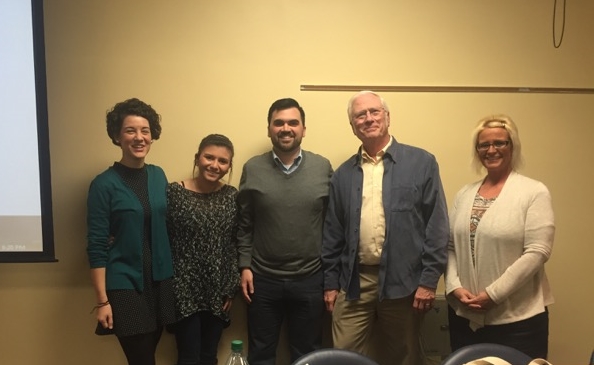Laura Leben, President of Drake Next Course, saw job posting on campus for a student to start a food recovery program, thought how beautifully the opportunity combined her interests in environmental issues (food waste) with social justice concerns (fighting hunger), and didn't hesitate to apply. One year later, Drake Next Course has recovered over 6,000 pounds of food and raised the second most money for this year's #GivingTuesday #FRNdzy. We're pretty impressed - read more about Laura and Drake University's chapter below.
THE BASICS
Name: Laura Leben
School: Drake University (Des Moines, IA)
Year of Graduation: 2016
Major/area of study: Environmental Science with a minor in Sociology
Position on leadership team: President
WE ASKED LAURA...
Where are you from? St. Charles, IL
How did you get involved in FRN? There was a job posting that Drake’s Community Engagement and Service-Learning Office was offering that was looking for a student to start some sort of food recovery program on campus. I saw how beautifully this opportunity combined my interests in environmental issues (food waste) with social justice concerns (fighting hunger), so I did not hesitate to apply and accept the offer. Sodexo was on board right away.
I built the organization from there, first by partnering with professors and a Freshman Year Seminar course, partnering with the Drake Environmental Action League (a student organization), then creating a club of volunteers devoted to food recovery, called Next Course, and then finally partnering with the national Food Recovery Network for even more support.
Can you share a favorite FRN memory? A few months ago, Next Course hosted Ben Simon, one of the original FRN founders and former executive director, to come to Drake and give a talk about his experiences working with these issues. It was great to gather so many people together to talk about the realities of food waste and gave us a lot of momentum and inspiration to keep going. (Thanks, Ben!)
What's one thing you love about Drake University? Drake is a great space where anything is possible. It was easy to start a new organization and rally support from other students around the issues. There are a lot of great, positive people here and I really enjoy doing what I do as a result.
What are your ambitions post-graduation? I am graduating in May, so I am currently looking for jobs in the field of environmental science, specifically in restoration ecology and conservation of native species and native land.
What other organizations are you involved in? I am also a member of the Drake Environmental Action League (DEAL) where we work hard to promote sustainability on campus with various initiatives. This year, DEAL is working to plant native species around campus to create habitat for native pollinators, increase recycling awareness, build up and strengthen our composting programs on campus, divest from fossil fuels, look into installing solar panels and install electric and heat metering on the buildings on campus.
Interested in learning more about Drake University's chapter? Check them out here and on Facebook and Twitter.










